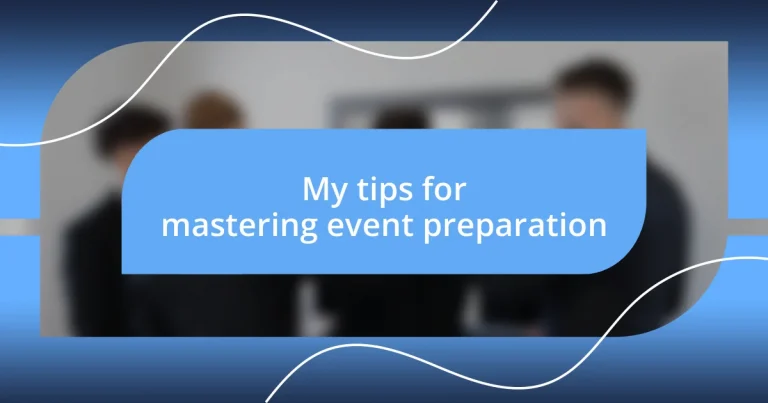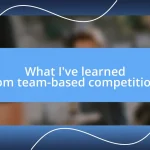Key takeaways:
- Establishing clear event goals and a structured timeline are essential for a successful planning process.
- Budgeting effectively, including researching costs and allocating funds for unexpected expenses, helps avoid financial pitfalls.
- Engaging with vendors through open communication and clear expectations enhances creativity and ensures smoother event execution.
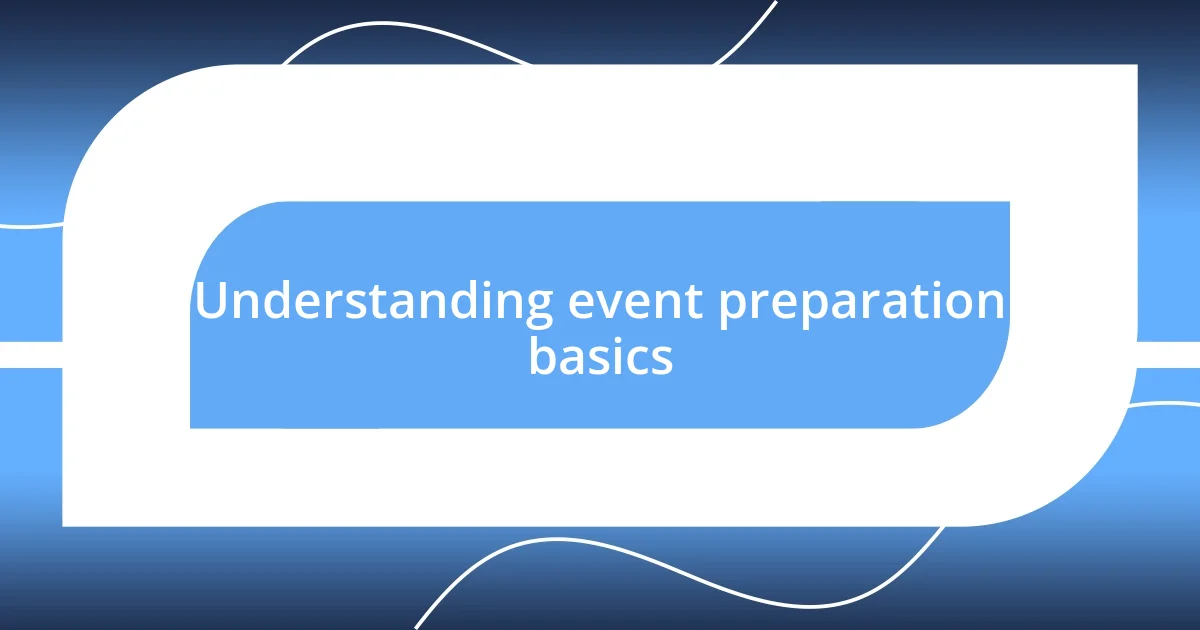
Understanding event preparation basics
When I first started planning events, I found myself overwhelmed by all the details. I realized that understanding the basics was crucial. What do you think is the most important aspect of event preparation? For me, it’s having a clear vision, as this serves as the foundation for every decision you make moving forward.
One of the key elements I learned early on is the necessity of a timeline. I vividly recall a time when I neglected this detail; the chaos that ensued taught me the hard way. By breaking down tasks into manageable steps, I found I could focus on one thing at a time, reducing my stress and increasing my productivity.
Budgeting is another fundamental aspect that shouldn’t be overlooked. I once worked on an event that spiraled out of control financially because we didn’t keep tabs on our spending. Have you ever experienced a budget crisis? To avoid that, I now create a detailed budget plan upfront, which helps me allocate resources efficiently and ensures I stay on track.
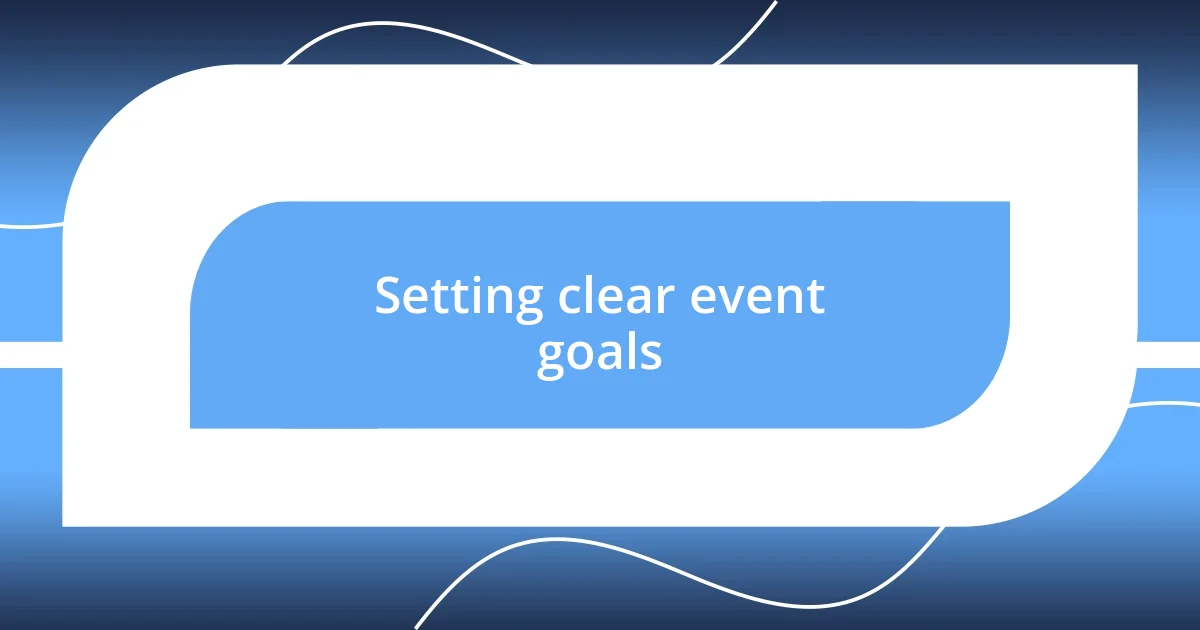
Setting clear event goals
Setting clear goals for your event is like laying the foundation for a house; without it, everything can crumble. During my first major event, I learned the hard way how crucial it is to define specific objectives. I remember aiming to simply “create a fun gathering,” but that vague goal led to scattered efforts and an underwhelming outcome. Now, I ask myself: What exactly do I want attendees to feel or gain from this event? Clarity in goals ensures I can measure success and adjust my strategies accordingly.
Goals can be broad, like increasing brand awareness, or specific, such as attracting 200 attendees. I’ve found that breaking down larger goals into digestible chunks makes them more attainable. For instance, I targeted specific demographics for a charity event, which helped tailor marketing efforts effectively. This focused approach not only boosted attendance but also enhanced engagement, ultimately leading to a memorable experience for everyone involved.
Overall, setting clear event goals shapes the entire planning process. It acts as a guiding star that keeps everything aligned. This wasn’t apparent to me in the beginning, but after successfully executing several events, I learned that when goals guide the preparation, the experience naturally unfolds in a way that feels effortless and meaningful.
| Type of Goal | Description |
|---|---|
| Broad Goals | General aspirations like brand awareness or community engagement. |
| Specific Goals | Measurable targets such as attendance numbers or fundraising amounts. |
| Qualitative Goals | Focus on attendee experience and feedback – how you want them to feel. |
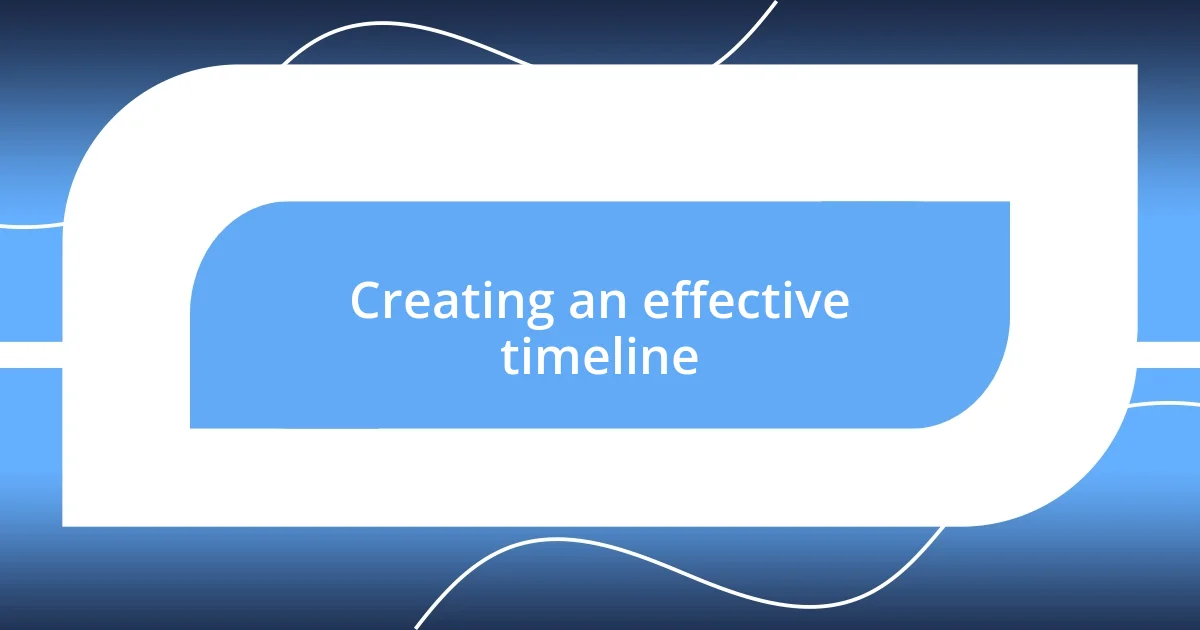
Creating an effective timeline
Creating an effective timeline is essential if you’re aiming to execute a successful event. I remember a wedding I coordinated where I thought I could just wing it—huge mistake. Without a structured timeline, the day felt chaotic. I quickly learned that breaking tasks down into smaller, scheduled segments helps keep everything on track and reduces that overwhelming feeling.
Here’s a simple outline to help you craft your event timeline:
- Start Date: Identify when the event will take place.
- Key Milestones: List major tasks and deadlines, like venue booking and vendor contracts.
- Weekly Check-ins: Set aside time each week to review progress and adjust as needed.
- Last-Minute Tasks: Highlight essential activities in the final week, such as confirming attendee RSVPs.
- Day-of Schedule: Draft a detailed itinerary for the event day, including setup and breakdown times.
When I embrace this structured approach, it feels remarkably empowering. It gives me a sense of control over what can easily spiral into a jumble of last-minute tasks. Knowing that I have a roadmap makes all the difference in mitigating stress and fostering a smoother event execution.
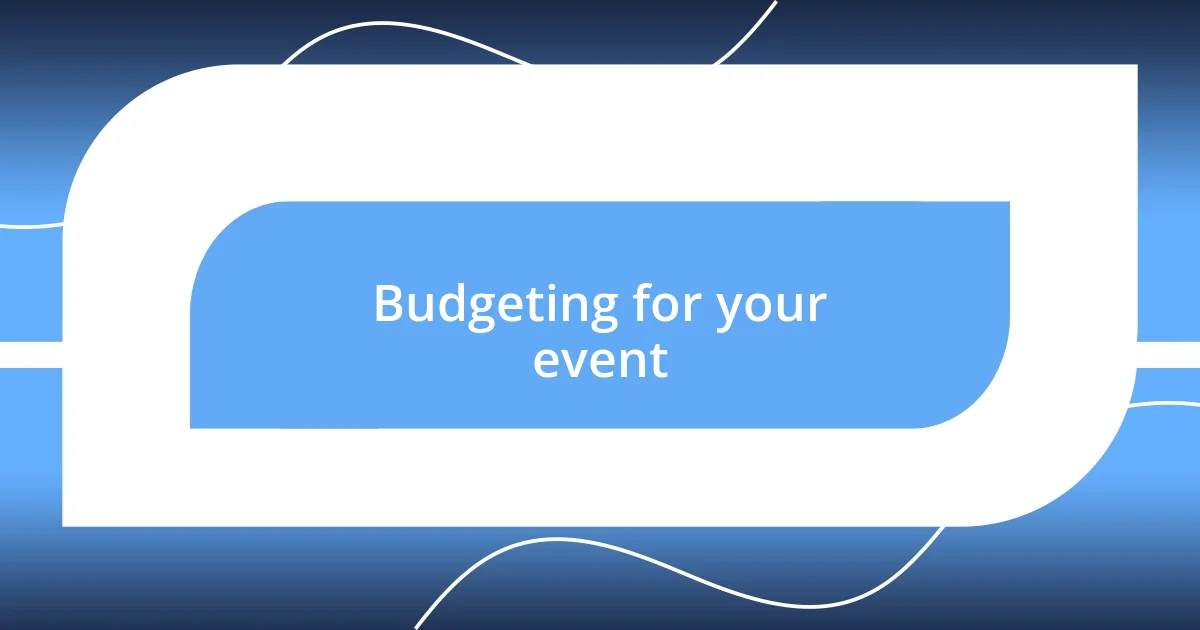
Budgeting for your event
Budgeting for your event can feel daunting, but I find a well-planned budget makes all the difference. Early in my event-planning journey, I dove in without a clear financial plan and ended up overspending on things that didn’t even matter much, like fancy decorative items. Now, I always start by outlining my essential expenses, such as venue rental and catering, before considering any extras. Have you ever wondered how those small additions can unexpectedly inflate costs? I can assure you, they can really add up!
I take the time to research prices and compare vendors. I’ll never forget the relief I felt when I discovered a local caterer who offered a delicious menu at a fraction of the expected cost. That moment taught me the power of thorough research. Being diligent during this phase not only keeps expenses in check but also gives me the freedom to allocate funds to more impactful components, like entertainment or engaging activities.
Lastly, it’s vital to build a buffer into your budget for unforeseen expenses because let’s face it, things don’t always go as planned. I’ve learned this the hard way when unexpected fees popped up just days before an event. Creating a buffer gives me peace of mind and allows for flexibility, making the planning process a lot less stressful. So, when you’re preparing your event budget, remember: a well-thought-out budget isn’t just about limiting spending; it’s about ensuring you can deliver the best experience possible without financial anxiety.
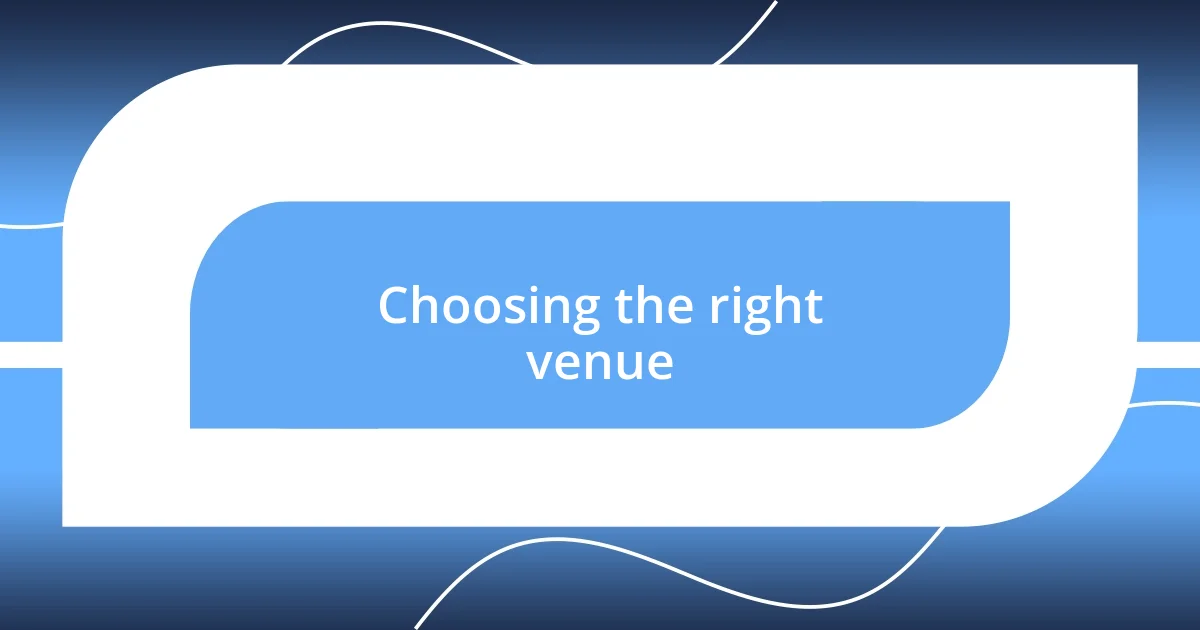
Choosing the right venue
When it comes to choosing the right venue, I’ve found that location is everything. For one of my annual conferences, I once opted for a beautifully scenic place, but it was so remote that many attendees struggled to get there. I learned that balancing aesthetics with accessibility is crucial. You want a venue that not only impresses but also invites everyone in with ease. Have you ever considered how the venue’s distance can impact attendance? It can truly make or break your event.
Then, there’s the atmosphere. I recall selecting a quaint, rustic barn for a corporate retreat, which seemed perfect at first. However, the lack of Wi-Fi and air conditioning turned it into an uncomfortable challenge for my group. Make sure to align the venue’s features with your event’s necessities. Think about your audience—will they appreciate an intimate setting, or do they prefer something expansive? I always ask myself what kind of energy I want participants to feel as they walk in.
Lastly, don’t underestimate the importance of facilities. During a gala I organized, I was caught off-guard by a venue that didn’t have enough restrooms. Can you imagine the chaos that ensued? I now always inquire about the capacity and amenities upfront. A great venue should offer everything you’ll need to keep your guests comfortable and engaged. Planning ahead in this way not only reassures me but also creates a more enjoyable experience for everyone involved.
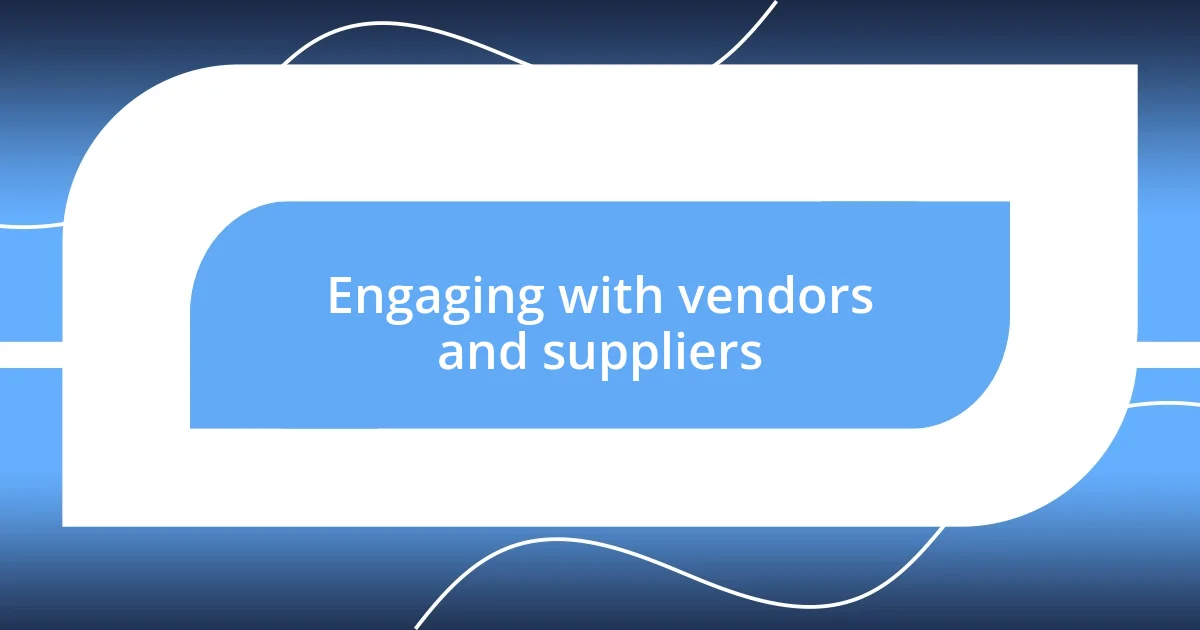
Engaging with vendors and suppliers
Engaging with vendors and suppliers is a critical part of event preparation that can truly define the overall experience. I remember my first attempt at negotiating with a vendor; I was nervous and didn’t know what to expect. To my surprise, fostering an open dialogue led to a wonderful collaboration. Have you ever felt that building a relationship with vendors can actually enhance your event? I’ve discovered that when I treat them as partners rather than just service providers, it often results in better support and creativity.
Communication is key. I typically make it a point to meet vendors in person when possible or schedule calls to discuss not just the logistics but also my vision for the event. Once, I had a floral supplier who was initially hesitant about my idea for a unique centerpiece. After a thorough discussion where I shared my inspiration, they came up with an innovative solution that exceeded my expectations! Engaging with them on a personal level made all the difference and ignited their creativity.
I also believe it’s important to clearly outline expectations and limitations early on. Early in my career, I learned the hard way that unclear communication can lead to misunderstandings. One time, a sound technician set up equipment that wasn’t compatible with the venue’s layout. The stress that caused was memorable, to say the least! Now, I make it a priority to establish clear agreements so everyone is on the same page. How do you ensure that your communications with vendors are effective? I find that a simple checklist or a summary email can transform the way we work together, paving the way for a smoother event execution.
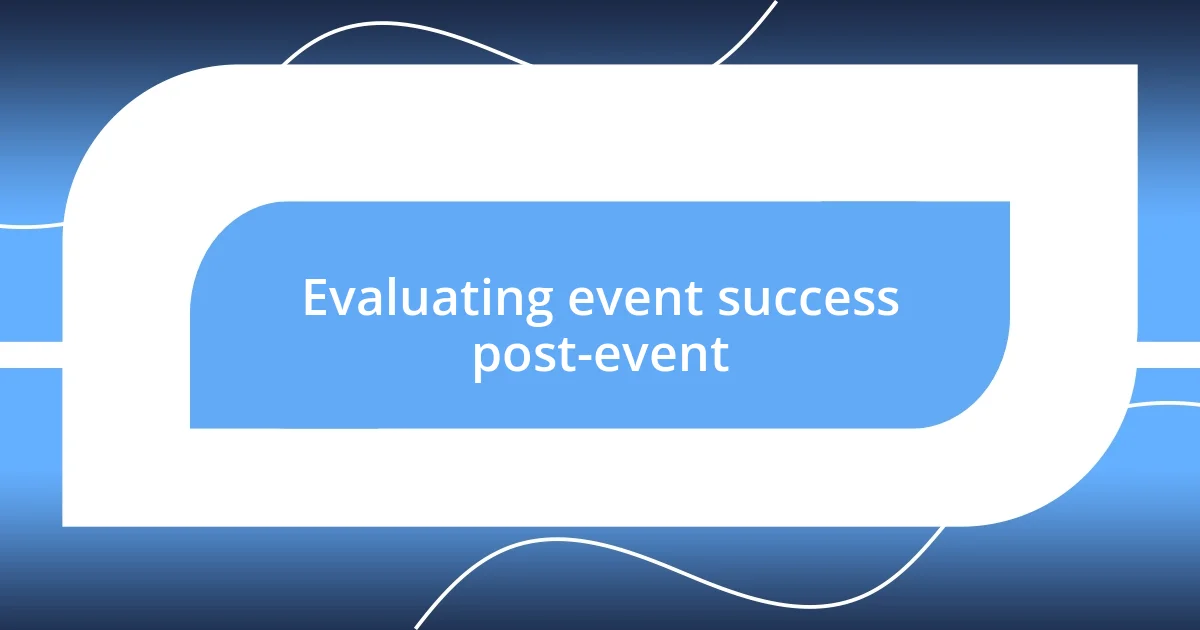
Evaluating event success post-event
Evaluating the success of an event is a task that often reveals more than one might initially think. After my last fundraising gala, I remember feeling both exhilarated and nervous as I sifted through feedback. I was surprised to discover that while attendance was high, many guests noted a lack of clarity in the evening’s schedule. Have you ever felt that a smooth program can elevate an event? It’s a lesson I take to heart—having a well-structured agenda can truly enhance the participant experience.
To assess success, I also dive into the data. Post-event surveys can be goldmines of information. I recall sending out a simple questionnaire after a workshop I conducted. The responses provided insights into what resonated with attendees and areas that need refinement. One surprising takeaway was that some participants wanted more interactive segments. I underestimated how much engagement mattered to them. How do you usually gather feedback? I’ve found that offering an incentive for completion can increase response rates, making it easier to gather valuable insights.
Lastly, reflecting on financial outcomes plays a critical role in my evaluations. During one particularly ambitious event, the budget felt tight leading up to the day. Once I crunched the numbers post-event, I was ecstatic to find that we exceeded our goals! But more importantly, understanding which sponsorships and ticket tiers worked helped me strategize for future events. I often ask myself, how can I create a trend of success? Evaluating both qualitative and quantitative feedback allows me to not only celebrate achievements but also prepares me for the journey ahead.












